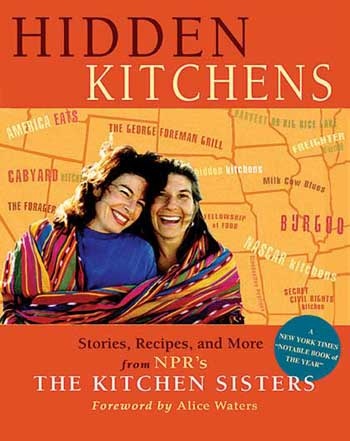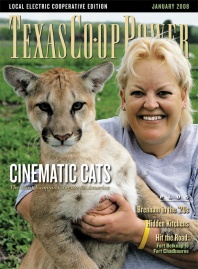National Public Radio (NPR) has been airing stories about “hidden kitchens”—places where food and story merge, whether through history, tradition, local acclaim or eccentricity. Produced by Davia Nelson and Nikki Silva, otherwise known as the Kitchen Sisters, the stories began with listeners who called in to a special Hidden Kitchens hotline. There were so many calls from Texas that the pair decided to make an hour–long special about our state. With help from Willie Nelson in the form of narration, the Kitchen Sisters put together “Hidden Kitchens Texas.”
Among other tales, this eclectic collection chronicles the birth of the Slurpee, the margarita and Fritos, as well as the traditions of ice houses, chili queens and trail rides. (If you haven’t heard it on the radio, you can go to kitchensisters.org and click on Hidden Kitchens Texas to listen online.)
I caught up with the Kitchen Sisters to ask a few questions:
What stood out to you about the Hidden Kitchens of Texas?
Davia: It wasn’t just the food, it was the way people talked about the food, it was the story behind the food, it was eccentricity and the vision people had for how they could glue their community together through food—even a plow disk was a place to cook on. There’s no element to life that’s not some implement to cook with. A big barrel barbecue [trailer] is a place to get married on. The items of food are just so part of the fabric of life.
Nikki: And the storytelling—that was what drew us to even think about doing a whole hour on Texas to begin with.
Davia: The place is so vast, so the stories are so vast. It’s cowboy culture, it’s farming culture, it’s cotton-picking culture, it’s chili queens in San Antonio and ice house culture. There’re just so many different traditions and ways of life there. And people care about the history; it really matters to them.
Nikki: There’s such a sense of place and family. I know things are changing [in Texas] like everywhere, but still, you do have this very distinct sense of place. Wherever we went, people were very proud and descriptive about where they came from and where they were living, so it makes for a great story.
Davia: Plus everyone always invited us to come eat with them. And that determines a lot where we go. [Both laugh.] So there’s that hospitality.
I imagine the hardest part of your job is deciding what to leave out.
Davia: Our programs are only 6 minutes, 30 seconds long. And even with the hour-long Texas piece—we were going, “Oh, an hour!” and then when we got into it we were going, “We need another hour. And another hour. We need more hours!”
The stories in this special are mostly from Austin, San Antonio, Houston and Dallas. Why not more from rural areas?
Davia: Not being from Texas, we kind of underestimated what it would take to really cover all of Texas. [Both laugh.] No matter where we were, we weren’t somewhere! You know, once you’d get into one town, even the small towns breed 10 or 20 stories; imagine what the big towns breed, like a place like Houston. … With the trail ride tradition in Houston, we figured trail riding and cowboying was a tradition that kind of ran through many people’s lives in Texas, so even if we weren’t in those areas, we were hoping we were capturing some of what that meant.
Nikki: It was so hard. That was one of the hardest things. We really wanted to spend more time and go more small places.
#1 Original San Antonio Chili
Recipe from Hidden Kitchens (Rodale, 2005)
2 pounds beef shoulder, cut into 1/2- inch cubes
1 pound pork shoulder, cut into 1/2- inch cubes
1/4 cup suet
1/4 cup pork fat
3 medium onions, chopped
6 garlic cloves, minced
1 quart water
4 ancho chiles
1 serrano chile
6 dried red chiles
1 tablespoon comino seeds, finely ground
2 tablespoons Mexican oregano
Salt to taste
Place lightly floured beef and pork cubes in with suet and pork fat in heavy chili pot and cook quickly, stirring often. Add onions and garlic and cook until they are tender and limp. Add water to mixture and simmer slowly while preparing chiles. Remove stems and seeds from chiles and chop very finely. Grind chiles in molcajete (mortar and pestle) and add oregano with salt to mixture. Simmer another 2 hours. Remove suet casing and skim off some fat. Never cook frijoles (beans) with chiles and meat. Serve as separate dish.


